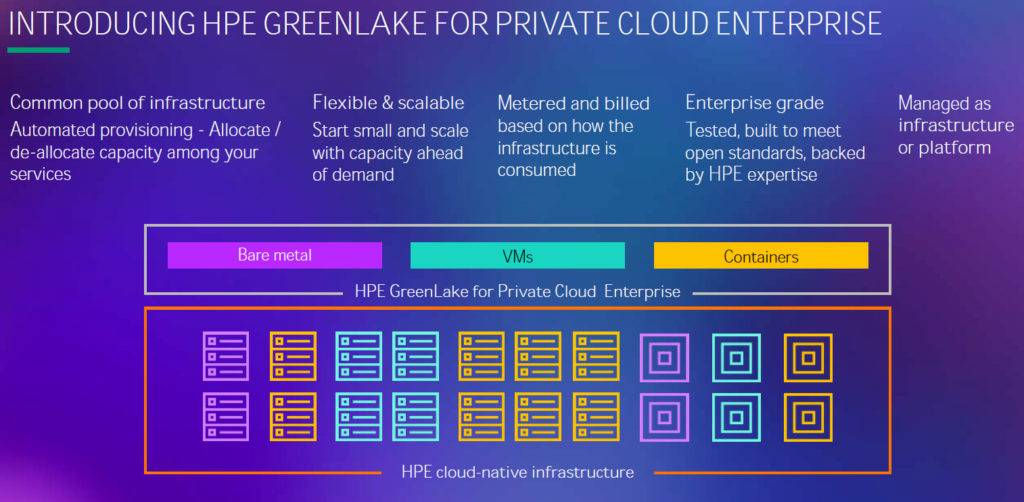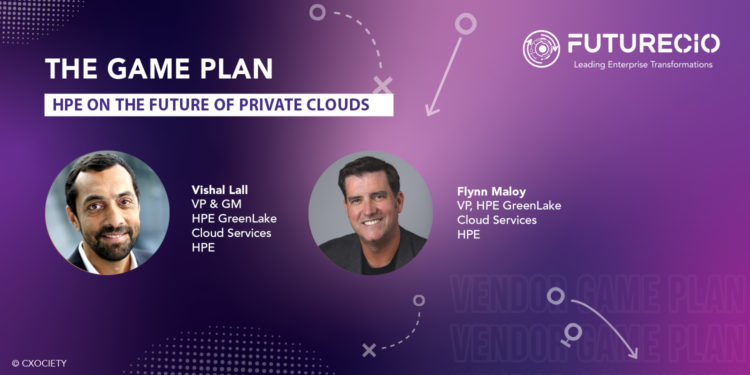Backdrop: With the launch of HPE GreenLake for Private Cloud Enterprise, HPE looks to modernise the private cloud experience with automated, flexible, scalable pay-as-you-go private cloud for traditional and cloud-native workloads.
At a media briefing, Vishal Lall, SVP & GM for HPE GreenLake cloud services solutions and Flynn Maloy, VP for HPE GreenLake Cloud Services, commented on the company’s direction around HPE GreenLake.
What are the exciting use cases for the HPE GreenLake change for organisations that are looking to make this contemporary move in their data centre?


Flynn Maloy: You know, everybody is looking to modernise their applications, but we believe that the world is going to be hybrid. We believe that the public cloud is a very important tool in your toolbox, as is GreenLake. Look at what is the workload that you've got? What are the apps and data that you've got? Where does it most want to be?
"If given the choice, everybody wants the cloud experience. They want to modernise; they want speed and agility, but can you bring the cloud to me? Can I have the cloud experience for my epic medical records, but out of my own private environment? This is a very attractive value proposition."
Flynn Maloy
A use case that's very common for us in healthcare. One MRI is 30 GBs of memory and very private information. There are a lot of hospitals and healthcare organisations that are running medical records, for example.
Another great example is a large global logistics company that I was speaking to. They are big in Asia – logistics, transportation, trucking, and shipping – and they're an SAP shop. But with modern SAP, every time you move an inventory piece to another shelf, put it on a truck, and take it off the truck, that all create a record in SAP.
And every one of those must cycle through the public cloud. If you put it up here, it's not really the latency of the moment, but the cumulative latency that is just too much for them. That company wants the cloud experience. They need to modernise their apps and get fast, but they need something that's going to come to them on their edge and in their private environment.
When evaluating between a data fabric and data mesh, how does an organisation decide which is the right approach for themselves?
Vishal Lall: The way I think about this is that it very much depends on the customer. I would say we have moved on from data lakes. Most companies think about data lakes as a thing of the past, but data fabric and data mesh are the technologies of the present and the future. And in many ways, it's the operating model that customers want to use.

"From a data fabric perspective, it's the mechanism by which you can break down silos. And the reason it's getting more important is with the adoption of public cloud, silos are increasing. Earlier, it was more like “Hey, I have some data in Unix and some data in x86 environments.”"
Vishal Lall
But now it is more like, “Oh, I have some data in my environment, and I have some data in AWS and I have some data in Google, now how do I get the best of all of that and get the best business insight that taps into all of that data?”
These are the types of examples where data fabric comes into use. Because it’s really a layer that sits on top of a different side of the different data silos, and that virtualisation helps access data across different repositories so that customers and enterprises can then make business decisions based on that data.
Data mesh, on the other hand, is, I would say, fundamentally quite different. It is distributed data. And it's the distributed group of teams that manage data as they see fit with some common governance provisions. So, it's a little bit more distributed and less structured than what we see with the data fabric.
And that's kind of what we see customers migrate towards.
Flynn Maloy: I think it is about the data, about where it is. We think that this level of data fabric is new in the hybrid cloud. Being able to offer a cross-stream file object in a private environment, distributed not just in the public cloud, but out where you have your multi-generational IT, and you've got data that are captured in these different on-prems systems.
So being able to put a global namespace over all of that I think is important. And it depends on what you're looking to do. The second thing I'll say is it also depends on what type of application you want to use for your analytics.
When it comes to cloud-based contracts, who will own the relationship with the customer?
Flynn Maloy: It’s HPE in that case. It is up to the customer's choice. So if they have a preexisting relationship, for example, with Equinix, we can certainly work within that. But by and large, this isn't just “we're taking our stuff and putting it in their environment”. This is joint engineering, so it is one contract. It's one phone call. It is one joint solution, one set of pricing and one contract, and it's built-in.
And in fact, we have such a rich relationship now that when our sales teams and our partners are going through our quoting tools, there's a checkbox: “Do you want to put this into a colo? Which one? Who do you want to work with? Like, let's trigger that conversation so that we can land it where we want to.”
This is a very integrated part of the go-to-market solution for GreenLake. And we do front it and we do own the contract. However, if you do have an existing relationship with Digital Realty and Equinix, we can certainly work in a partnership way with your customers in order to bring GreenLake to what you already are doing.
Vishal Lall: That's exactly what I would say. The guiding principle that we've taken is that we have open systems, right? Open partnerships. But we have opinions. So everything that we have is opinionated, but if somebody wants to go a different route it’s great.
Going back to what we are seeing from customers, they want one bill. And from our perspective, we can do that. And with the scale that we have, we also have better rates and better prices with some of these people, which we’ll pass on to customers.
So, there are a lot of benefits to going to us. And the customers don't want to manage that infrastructure like I was saying earlier. They're like: “Hey, HPE, do it for us. Provide us with that surface area. Provide us with virtual machines like AWS does or containers like AWS does and we’ll run applications on that. Everything else beyond that, you take care of.”
And that's what we are bringing to them. A one-stop-shop, a single bill, pay-as-you-go. Scalable and expandable. Do you want to burst out into the public cloud? Great. Do you want to go back up into the public cloud? Great. Do you want to do a hybrid? Great. We can do it all. So that's the way we are approaching this from a philosophical perspective.




